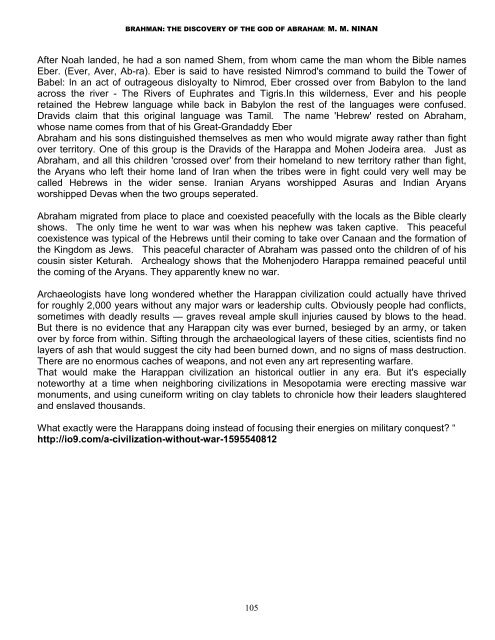You also want an ePaper? Increase the reach of your titles
YUMPU automatically turns print PDFs into web optimized ePapers that Google loves.
BRAHMAN: THE DISCOVERY OF THE GOD OF ABRAHAM: M. M. NINAN<br />
After Noah landed, he had a son named Shem, from whom came the man whom the Bible names<br />
Eber. (Ever, Aver, Ab-ra). Eber is said to have resisted Nimrod's command to build the Tower of<br />
Babel: In an act of outrageous disloyalty to Nimrod, Eber crossed over from Babylon to the land<br />
across the river - The Rivers of Euphrates and Tigris.In this wilderness, Ever and his people<br />
retained the Hebrew language while back in Babylon the rest of the languages were confused.<br />
Dravids claim that this original language was Tamil. The name 'Hebrew' rested on Abraham,<br />
whose name comes from that of his Great-Grandaddy Eber<br />
Abraham and his sons distinguished themselves as men who would migrate away rather than fight<br />
over territory. One of this group is the Dravids of the Harappa and Mohen Jodeira area. Just as<br />
Abraham, and all this children 'crossed over' from their homeland to new territory rather than fight,<br />
the Aryans who left their home land of Iran when the tribes were in fight could very well may be<br />
called Hebrews in the wider sense. Iranian Aryans worshipped Asuras and Indian Aryans<br />
worshipped Devas when the two groups seperated.<br />
Abraham migrated from place to place and coexisted peacefully with the locals as the Bible clearly<br />
shows. The only time he went to war was when his nephew was taken captive. This peaceful<br />
coexistence was typical of the Hebrews until their coming to take over Canaan and the formation of<br />
the Kingdom as Jews. This peaceful character of Abraham was passed onto the children of of his<br />
cousin sister Keturah. Archealogy shows that the Mohenjodero Harappa remained peaceful until<br />
the coming of the Aryans. They apparently knew no war.<br />
Archaeologists have long wondered whether the Harappan civilization could actually have thrived<br />
for roughly 2,000 years without any major wars or leadership cults. Obviously people had conflicts,<br />
sometimes with deadly results — graves reveal ample skull injuries caused by blows to the head.<br />
But there is no evidence that any Harappan city was ever burned, besieged by an army, or taken<br />
over by force from within. Sifting through the archaeological layers of these cities, scientists find no<br />
layers of ash that would suggest the city had been burned down, and no signs of mass destruction.<br />
There are no enormous caches of weapons, and not even any art representing warfare.<br />
That would make the Harappan civilization an historical outlier in any era. But it's especially<br />
noteworthy at a time when neighboring civilizations in Mesopotamia were erecting massive war<br />
monuments, and using cuneiform writing on clay tablets to chronicle how their leaders slaughtered<br />
and enslaved thousands.<br />
What exactly were the Harappans doing instead of focusing their energies on military conquest? “<br />
http://io9.com/a-civilization-without-war-1595540812<br />
105


















